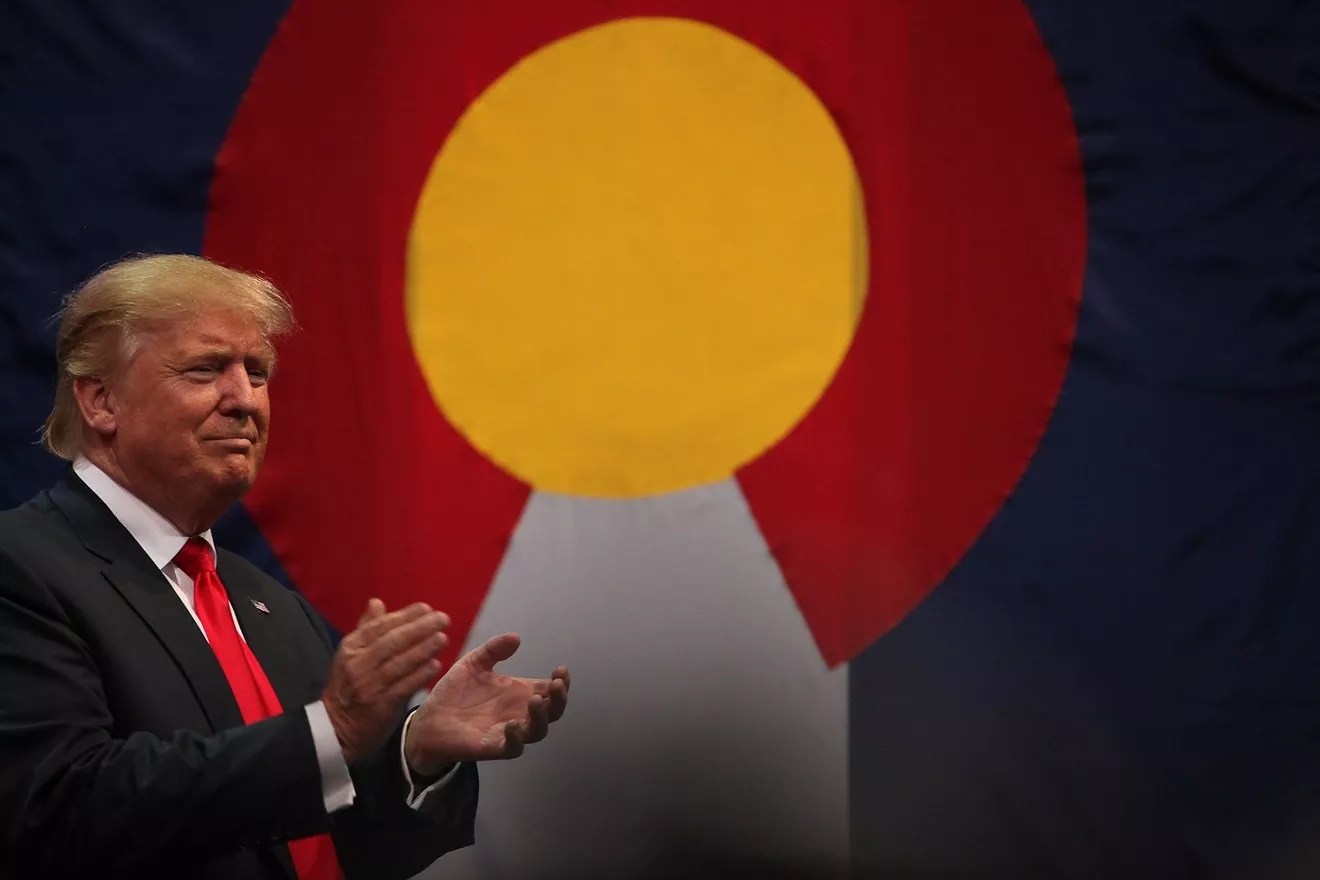
Evan Semón Photography

Audio By Carbonatix
“I’m going to win Colorado,” Donald Trump proclaimed last weekend.
Wrong.
On November 5, as a red wave washed over much of the country, Colorado was called for Kamala Harris, then leading Trump by about 11 percent in the state. But that result couldn’t have been much of a surprise to anyone but Trump, who likes to say that Colorado’s election system is “rigged” – a claim he started in 2016, when Ted Cruz beat him at the state Republican Party convention; repeated after his loss of the White House in 2020; and threw out again at his October rally in Aurora, taking a break from his incendiary diatribe against immigrants to accuse Governor Jared Polis of being involved in the lawsuit to keep him off the 2024 Colorado presidential primary ballot.
Wrong again.
That lawsuit was filed by six Colorado voters, all either unaffiliated or Republican, who believed that Trump did not qualify for the ballot because of his actions on January 6, 2021. One was Norma Anderson, a 91-year-old lifelong Republican and respected former legislator. None were Jared Polis, much less the far-left “henchmen” or “Soros-funded Democrats” that Trump labeled them.
“Donald Trump tried to overthrow the results of the 2020 presidential election,” charged the suit, filed on behalf of the plaintiffs by Citizens for Responsibility and Ethics in Washington in Denver District Court on September 6, 2023. “His efforts culminated on January 6, 2021, when he incited, exacerbated, and otherwise engaged in a violent insurrection at the United States Capitol by a mob who believed they were following his orders, and refused to protect the Capitol or call off the mob for nearly three hours as the attack unfolded.”
As a result, the suit argued, Trump had violated the 14th Amendment, ratified by the states and added to the U.S. Constitution in 1868, three years after the end of the Civil War and eight before the Colorado territory joined the Union.
Last November, District Court Judge Sarah Wallace dismissed the suit, ruling that while Trump had indeed “incited” an insurrection on January 6, 2021, as president he did not qualify as an “officer” of the U.S., a requirement under Section 3 of the 14th Amendment: “No person shall be a Senator or Representative in Congress, or elector of President and Vice-President, or hold any office, civil or military, under the United States, or under any State, who, having previously taken an oath, as a member of Congress, or as an officer of the United States, or as a member of any State legislature, or as an executive or judicial officer of any State, to support the Constitution of the United States, shall have engaged in insurrection or rebellion against the same, or given aid or comfort to the enemies thereof….”
The plaintiffs appealed – as did Trump – and last December, the Colorado Supreme Court overturned the Denver judge’s decision. Not only did Trump incite the insurrection, it determined, but as president, he certainly qualified as an officer of the United States. “We do not reach these conclusions lightly,” the seven justices noted. “We are mindful of the magnitude and weight of the questions now before us.”
Trump again appealed, and on February 8, less than a month before Colorado was scheduled to hold its presidential primary, the U.S. Supreme Court heard oral arguments. Thirty-six hours before the last ballots could be cast in that primary, it handed down a ruling overturning the Colorado Supreme Court’s decision. In the process, the justices dodged any assessment of Trump’s behavior and simply determined that the matter of eligibility belonged with Congress, not a “patchwork” of state decisions.
“Big win for America,” Trump said.
He did not win the Colorado primary, however, and he did not win Colorado on November 5.

Donald Trump is no fan of Colorado.
Brandon Marshall
But the red wave is lapping at our borders.
More than twenty Coloradans have been charged in connection with what the Department of Justice refers to as the “Capitol breach”; on October 31, Littleton’s Patrick Montgomery was sentenced to 37 months in prison and 36 months of supervised release for assaulting, resisting or impeding certain officers. Others are still awaiting trial, but those cases could soon disappear: Trump has promised to consider pardons and “to many, an apology,” calling them “patriots and hostages” rather than traitors.
Monica M. Márquez, the chief justice of the Colorado Supreme Court who supported the majority decision that Trump was indeed an “insurrectionist,” became the target of a campaign to throw her off the bench; although she won retention, she’s been threatened. So have employees of Dominion, the Denver-based election system company, as well as county clerks. And journalists: “Tell the truth, all you bitches. Your day is coming,” one Trump supporter warned me at the Aurora rally.
The Capitol will probably be a lot quieter on January 6, 2025, the day that Donald Trump’s victory is set to be certified. But that is no win.